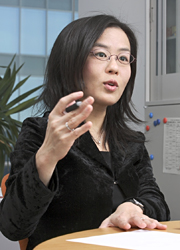2010/09/03
Computational linguistics and Natural Language Processing
Associate Professor Kumiko Tanaka-Ishii
(Department of Creative Informatics)

Language has become computable as massive quantities of language data became electronically available in the late 20th century. Associate Professor Tanaka-Ishii aims to develop language technology based on mathematical structures universally inherent in natural languages and semiotic systems with linguistic properties.
Humans eventually learn to recognize words and sentence structures and understand the meaning by hearing an exceedingly large number of sentences. If that is the case, there must be a key for basic structures and properties of language hidden in language data. Associate Professor Tanaka-Ishii is studying mathematical models of universal properties underlying in language data based on statistics and information theory and verifies them using large-scale language data. There are two types of studies: synchronic (seeking properties of language data at a given time, such as mathematical mechanisms for articulation, categorization, and structurization) and diachronic (mathematical models for the evolution of language, etymology of language).
Tanaka-Ishiiβs Lab is developing viable language processing software based on such mathematical models. Nowadays, it is essential to handle language on machines such as in search engines or machine translation and their element technologies are revisited since they are based on fundamental properties of language. Language interfaces such as text entry systems to support language processing are also studied including element technologies. Associate Professor Tanaka-Ishii and her students strive to develop creative ideas to support human communication using various small devices as extended media of human linguistic abilities.
Studies of such applicative language software often lead to basic research to pursue the essence of language and there is a complementary relationship between mathematical models and software engineering. The goal is to shed the light on the mystery of language and deliver on language studies based on innovative ideas and mathematical science viewpoints.

